Introduction
Caring for a baby parrot requires attention, patience, and the right knowledge. If you’re wondering how to care for a baby parrot, you’ve come to the right place. Baby parrots are delicate and need special care to grow healthy and happy.
From creating a safe space to feeding them properly, every step is important. In this guide, you’ll learn everything you need to know to give your baby parrot the best start in life.
Whether you’re a first-time parrot owner or looking for extra tips, this article will help you ensure your little feathered friend thrives. Let’s explore how to care for a baby parrot!
Preparing Your Home for a Baby Parrot
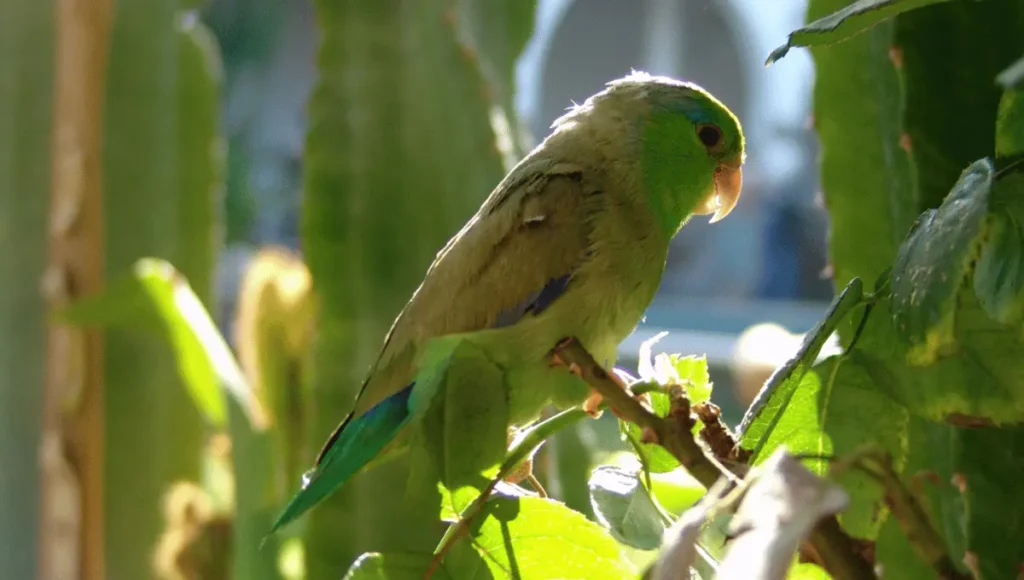
Bringing a baby parrot home means creating a safe and comfortable environment for it to thrive. Here’s how to prepare everything you’ll need:
Creating a Safe and Comfortable Environment
Your baby parrot’s new home needs to be cozy, safe, and well-prepared. Start by choosing the right cage, as this will be your parrot’s main living space.
Choosing the Right Cage
Make sure the cage is spacious enough for your baby parrot to move around, but not too large that they feel lost.
The bars should be close enough together to prevent the baby from squeezing through. Line the bottom of the cage with soft bedding to keep your parrot comfortable.
Maintaining Proper Temperature and Humidity
Baby parrots are sensitive to temperature changes. Keep the room warm, ideally between 80-85°F (26-29°C), to ensure your parrot stays healthy.
You can use a heat lamp or heating pad near the cage to maintain warmth. Also, make sure the room isn’t too dry—parrots need a little humidity to feel comfortable. A small humidifier can be used if necessary.
Essential Supplies for Baby Parrot Care
Before bringing your baby parrot home, gather all the necessary supplies to make sure they are comfortable and entertained.
Feeding Tools, Bedding, and Perches
You’ll need special feeding tools like syringes if you’re hand-feeding your baby parrot. Make sure to have fresh, soft bedding in the cage to keep them cozy.
Also, place low perches in the cage that are easy for your parrot to reach. Avoid high perches until they’re stronger.
Safe Toys for Mental Stimulation
Baby parrots love to play, so choose toys that are safe and engaging. Small, chewable toys, colorful hanging toys, and soft bells are great options.
These toys help keep your baby parrot mentally stimulated and prevent boredom. Just make sure they’re safe for baby birds—no sharp edges or small parts they can swallow.
By setting up a proper home for your baby parrot, you’re ensuring they feel secure, comfortable, and ready to grow into a healthy adult.
Feeding Your Baby Parrot
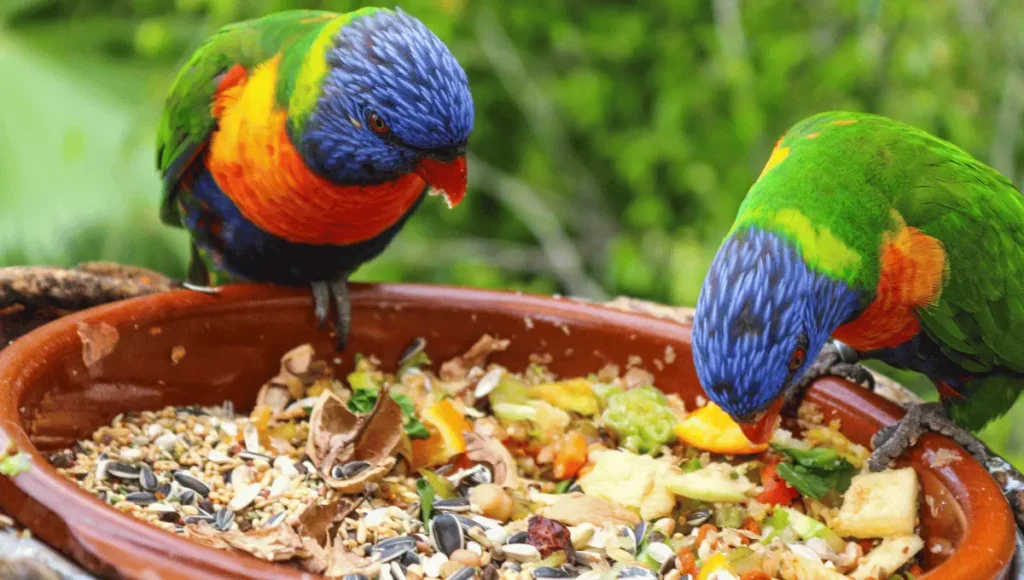
Feeding a baby parrot properly is one of the most important parts of their care. Their nutritional needs are different from adult parrots, and providing the right food in the right way ensures they grow healthy and strong.
Let’s go over how to feed your baby parrot step by step.
Nutritional Requirements for Baby Parrots
Baby parrots need a special diet that provides them with the nutrients they require to grow.
Key Nutrients for Healthy Growth
Baby parrots need high amounts of protein, fats, and vitamins, especially in the early weeks. These nutrients help them develop strong bones, feathers, and a healthy immune system.
A good hand-feeding formula specifically designed for baby parrots will provide all the essential nutrients they need.
Foods to Avoid for Baby Parrots
Avoid giving your baby parrot foods that are hard to digest, like seeds, nuts, or fruits at this stage. They also shouldn’t eat anything that’s processed, salty, or sugary. Stick to a specially formulated baby parrot diet until they are ready for solid foods.
Baby Parrots Care
Here’s a comprehensive table on how to care for a baby parrot. This includes key areas of care, recommended practices, and important considerations.
| Care Aspect | Recommendations | Important Considerations |
| Housing | – Use a spacious cage with bars close enough to prevent escape.- Provide a safe, comfortable nesting area. | – Avoid drafts, direct sunlight, and extreme temperatures. |
| Diet | – Offer a balanced diet including pellets, seeds, fruits, and vegetables.- Provide fresh water daily. | – Steer clear of avocado, chocolate, and caffeine, as they are harmful and toxic to parrots. |
| Socialization | – Make time each day to connect with your parrot and enjoy meaningful interaction.- Handle gently to build trust. | – Introduce to different environments gradually to reduce stress. |
| Exercise | – Allow supervised out-of-cage time for flying and playing.- Provide toys for mental stimulation. | – Ensure the area is safe and free of hazards (e.g., open windows, other pets). |
| Health Care | – Schedule regular vet check-ups with an avian veterinarian.- Monitor for signs of illness (e.g., lethargy, changes in eating habits). | -Catching health problems early is essential for effective treatment. |
| Grooming | – Provide a shallow dish for bathing or misting with water.- Keep nails trimmed and beak in check. | – Regular grooming prevents health issues and improves comfort. |
| Training | – Start basic training early (e.g., step up, recall).- Use positive reinforcement techniques (treats, praise). | -Stay patient; successful training requires time and steady effort. |
| Enrichment | -Switch out toys and introduce fresh ones frequently to keep things exciting.- Encourage foraging by hiding treats in toys or around the cage. | – Providing mental stimulation helps avoid boredom and curbs destructive habits. |
| Safety | – Avoid toxic plants and chemicals in the home.- Ensure windows and doors are secure when the bird is out. | – Educate family members on parrot safety and handling. |
| Sleep | – Provide a quiet, dark area for sleep (10-12 hours per night).- Use a cover if needed for comfort. | – Sleep is essential for growth and well-being. |
Hand-Feeding vs. Self-Feeding
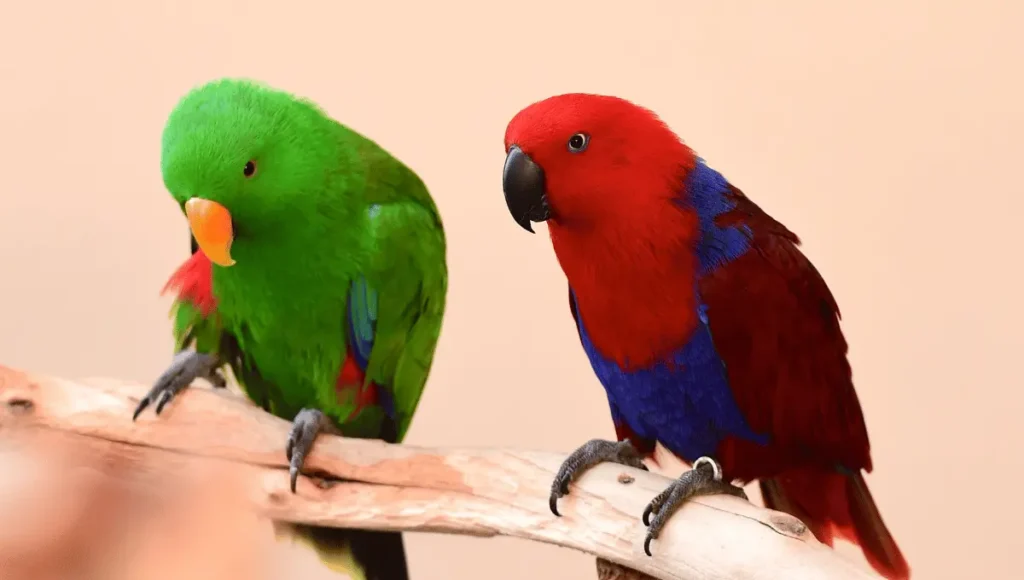
When baby parrots are very young, they need to be hand-fed until they can eat on their own.
How to Properly Hand-Feed a Baby Parrot
Hand-feeding is the most common method to feed a baby parrot. You’ll need a syringe and a good-quality hand-feeding formula. Warm the formula to around 100-105°F (38-40°C)—make sure it’s not too hot or cold.
Gently feed the baby parrot using the syringe, placing the tip inside their beak and letting them swallow slowly. Feed them every 3-4 hours, depending on their age.
Transitioning to Self-Feeding
As your baby parrot grows, they’ll start showing interest in picking up food by themselves. When they’re ready, you can start placing soft, mashed fruits and vegetables in their cage along with their regular formula.
Gradually reduce hand-feeding sessions as they get more comfortable eating on their own.
Introducing Solid Food
Once your baby parrot is ready, you’ll need to slowly introduce solid food into their diet.
When and How to Switch to Solid Foods
Around 8 to 12 weeks of age, most baby parrots will start transitioning to solid food. Begin by offering soft, easily digestible foods like cooked vegetables, small pieces of fruit, and specially formulated pellets. Place these foods in a shallow dish in the cage and let your baby parrot explore them.
Tips for Encouraging Proper Eating Habits
Be patient as your parrot gets used to new textures and tastes. Avoid offering too many different foods at once—start with small amounts of one or two new foods at a time.
Make sure their diet stays balanced by gradually introducing a variety of fresh fruits, vegetables, and high-quality parrot pellets.
Monitoring and Maintaining Your Baby Parrot’s Health
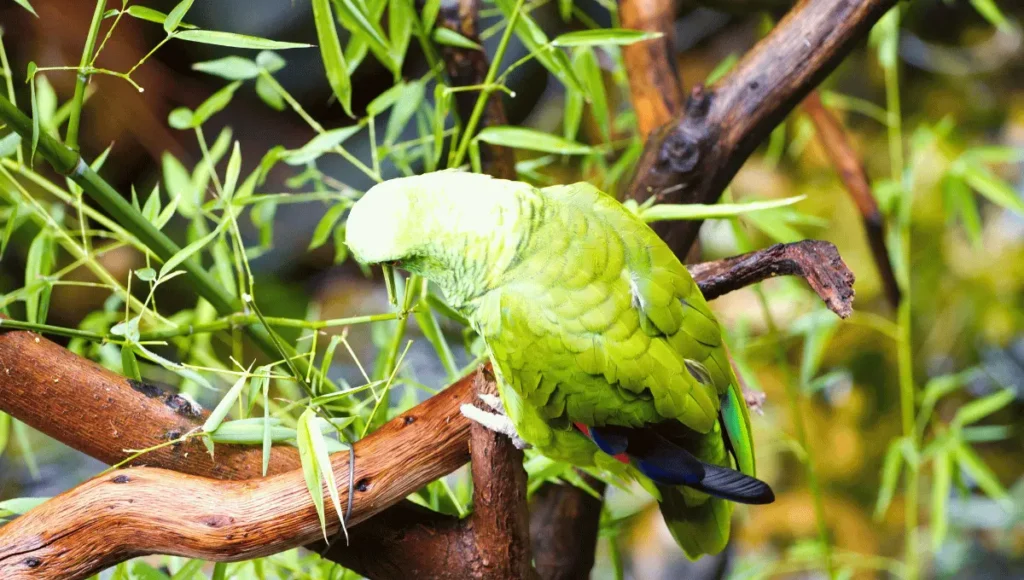
Keeping a close eye on your baby parrot’s health is essential for their well-being. Baby parrots are more vulnerable to illness, so it’s important to know the signs of good health and be prepared to handle any issues that may come up.
Let’s explore how you can monitor and maintain their health to ensure they grow strong and healthy.
Signs of a Healthy Baby Parrot
A healthy baby parrot will show clear signs that they’re thriving. By understanding these signs, you can easily spot if something seems off.
- Active Behavior and Bright Eyes
A healthy baby parrot will be active, curious, and alert. They should respond to sounds and movements around them. Their eyes should appear bright, clear, and without any signs of discharge. Dull or half-closed eyes can indicate illness or fatigue. - Clean and Smooth Feathers
As your baby parrot grows, their feathers will become more defined. Healthy feathers are smooth and clean. If you notice ruffled, dirty, or missing feathers, it could be a sign of stress or health problems. - Good Appetite and Regular Droppings
A healthy baby parrot will have a strong appetite and eat regularly. Their droppings should also be consistent in texture and color. Any sudden changes in appetite or the appearance of their droppings could be a sign of a health issue.
Common Health Issues in Baby Parrots
Even with the best care, baby parrots can face certain health problems. Knowing what to watch for will help you catch potential issues early.
Cognizing symptoms of Illness
Watch for signs of lethargy, lack of appetite, difficulty breathing, or changes in droppings. Other symptoms include puffed-up feathers, weight loss, or unusual sounds like wheezing or sneezing.
If your parrot shows any of these symptoms, it’s important to act quickly.
What to Do If Your Parrot Seems Unwell
If you notice any concerning symptoms, contact an avian vet right away. Identifying and treating issues early can help prevent them from becoming more serious.
Always have the contact information of a qualified bird vet on hand for emergencies.
Importance of Hygiene and Cleanliness
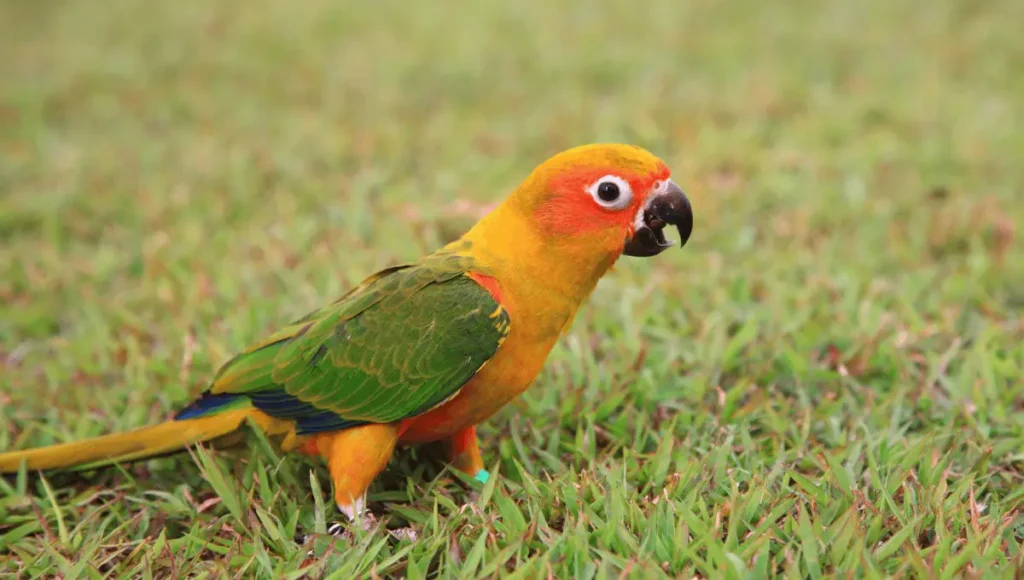
Keeping your baby parrot’s living area clean is crucial for preventing illness. Parrots are sensitive to dirty environments, so regular cleaning is key to their health.
Cleaning the Cage and Feeding Equipment
Clean your baby parrot’s cage daily to remove any leftover food, waste, and feathers. Make sure to wash their food and water dishes with warm, soapy water every day to avoid bacteria build-up.
A clean environment helps prevent infections and keeps your parrot comfortable.
Maintaining Proper Hygiene for Overall Health
In addition to cleaning the cage, make sure your baby parrot stays clean. Gently mist them with water or offer a shallow dish of water for light bathing. Bathing helps keep their feathers clean and free of dust.
Be sure to dry your parrot afterward to prevent them from getting chilled.
Socializing and Bonding with Your Baby Parrot
Socializing your baby parrot and building a strong bond is an important part of their development. Baby parrots are naturally social creatures, and creating a trusting relationship with them early on helps them feel safe and secure.
In this section, we’ll go over how to bond with your baby parrot and start basic training.
Building Trust with Your Baby Parrot
The foundation of a good relationship with your baby parrot is trust. To build trust, you’ll need patience and gentle interactions.
How to Properly Handle Your Parrot
When handling your baby parrot, always be calm and gentle. Speak softly, and avoid sudden movements that may scare them. Use your hand as a perch, letting them step onto it on their own.
Never force your parrot to interact—let them come to you at their own pace. This will make them feel comfortable and safe around you.
Tips for Bonding and Trust-Building
Spend time near your parrot’s cage, talking to them in a soothing voice. Offer treats like small pieces of fruit or vegetables from your hand to encourage positive interactions. Over time, your parrot will begin to associate you with safety and rewards.
The more time you share with your parrot, the deeper your bond will become. Gentle petting and scratching (once your parrot feels comfortable) can also help deepen the connection.
Early Training and Behavior Management
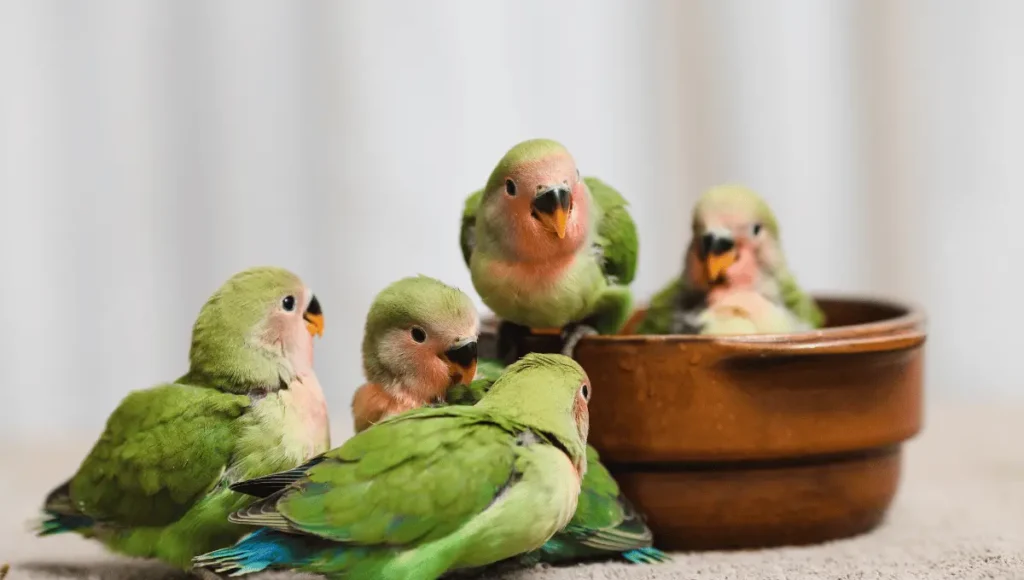
Training your baby parrot early will help them develop good behavior and avoid problems later on. Baby parrots are smart and eager to learn, making this a great time to start teaching basic commands.
Basic Training Techniques for Baby Parrots
Start with simple commands like “step up,” which teaches your parrot to step onto your finger or hand when asked. Hold a treat just above their feet and gently encourage them to step onto your hand, saying “Step up.”
Reward them with the treat and praise when they do it correctly. Repeat this process until your parrot learns the command.
Preventing Bad Habits from Forming
It’s important to set boundaries early on to prevent bad habits like biting or screaming from developing. If your baby parrot starts nibbling on your fingers or objects, gently redirect them with a toy. Never yell or punish them, as this can create fear.
Instead, reinforce positive behavior with rewards and affection. Consistency is key in teaching your parrot what’s acceptable and what isn’t.
Providing Mental and Physical Stimulation
Keeping your baby parrot mentally and physically stimulated is essential for their overall well-being. Parrots are intelligent and curious animals, and they need a variety of activities to stay happy and healthy.
In this section, we’ll discuss how to encourage play, interaction, and exercise for your baby parrot.
Importance of Play and Interaction
Playtime is not just fun for your baby parrot; it also helps them develop important skills. Engaging in play and interaction is key to their mental health.
Choosing the Right Toys for Cognitive Development
Select toys that are safe and encourage your parrot to explore. Look for colorful toys, chewable items, and puzzles that stimulate their curiosity. Toys with bells or mirrors can also grab their attention.
Rotate toys regularly to keep things interesting, as parrots can get bored quickly. Make sure all toys are made from bird-safe materials.
Spending Quality Time with Your Baby Parrot
Spend time interacting with your parrot every day. Talking, singing, or simply sitting near their cage can help them feel loved and secure. You can also let your parrot out of the cage for supervised playtime in a safe area.
This allows them to explore and play while building a stronger bond with you.
Encouraging Safe Exercise
Exercise is just as important for your baby parrot as mental stimulation. Consistent physical activity is essential for maintaining their health and fitness.
Supervised Free-Flight Time
If you have a safe, enclosed space, consider allowing your baby parrot to fly around for short periods. Supervise them closely to ensure they don’t fly into hazards or get hurt.
Free flight allows them to stretch their wings and enjoy the freedom of movement.
Setting Up Safe Areas for Exploration
Create a designated play area where your parrot can safely explore outside of their cage. Use a play gym or a flat surface covered with soft materials to prevent injuries.
Place toys and perches in this area to encourage climbing and playing.
Make sure to remove any objects that could be dangerous to your parrot, such as electrical cords or small items they could swallow.
Conclusion
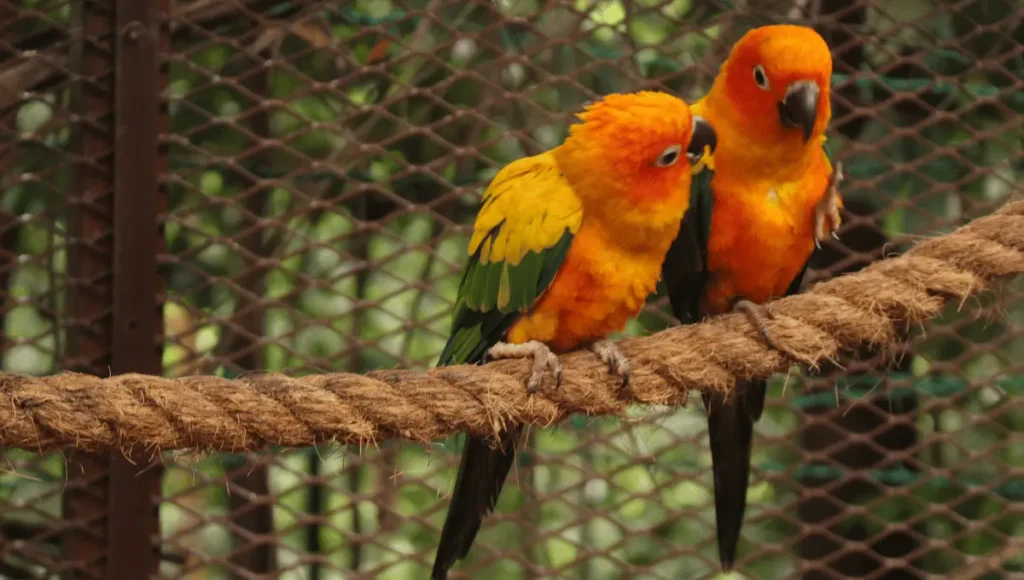
Caring for a baby parrot can be a rewarding and enjoyable experience. By providing the right environment, nutrition, and socialization, you set the foundation for a happy and healthy life for your feathered friend.
Remember to monitor their health closely, keep their space clean, and offer plenty of mental and physical stimulation. With patience and love, you can build a strong bond with your baby
parrot that will last a lifetime.
As you learn and grow together, you’ll discover just how wonderful it is to have a parrot as part of your family. Embrace the journey, and enjoy every moment with your new companion!
FAQs
What should I feed my baby parrot?
Baby parrots need a special hand-feeding formula that provides the right nutrients. As they grow, you can introduce soft fruits and vegetables, as well as high-quality pellets specifically made for parrots.
How often should I feed my baby parrot?
You should feed your baby parrot every 3 to 4 hours if you are hand-feeding. Once they start eating solid foods, you can offer meals several times a day, making sure they have fresh food available at all times.
How can I tell if my baby parrot is healthy?
A healthy baby parrot will be active, curious, and have bright, clear eyes. Their feathers should appear sleek and clean, and they should maintain a strong appetite.
Regular droppings that are consistent in texture and color are also signs of good health.
How can I bond with my baby parrot?
Spend time near your parrot, talking softly and offering treats to build trust. Gently handle them and let them come to you at their own pace. The more moments you share, the more your connection will deepen.
What kind of toys are best for baby parrots?
Look for toys that are safe and engaging, such as colorful chewable toys, puzzles, and items that make sounds.
Rotating toys regularly keeps your parrot entertained and helps stimulate their mind. Make sure that all toys are constructed from materials that are safe for birds.